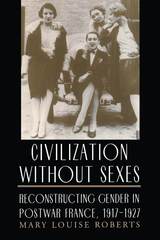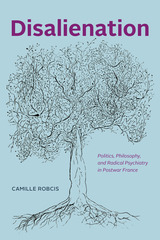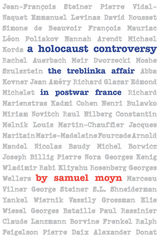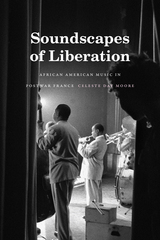6 books about Postwar France

After Django
Making Jazz in Postwar France
Tom Perchard
University of Michigan Press, 2015
How did French musicians and critics interpret jazz—that quintessentially American music—in the mid-twentieth century? How far did players reshape what they learned from records and visitors into more local jazz forms, and how did the music figure in those angry debates that so often suffused French cultural and political life? After Django begins with the famous interwar triumphs of Josephine Baker and Django Reinhardt, but, for the first time, the focus here falls on the French jazz practices of the postwar era. The work of important but neglected French musicians such as André Hodeir and Barney Wilen is examined in depth, as are native responses to Americans such as Miles Davis and Thelonious Monk. The book provides an original intertwining of musical and historical narrative, supported by extensive archival work; in clear and compelling prose, Perchard describes the problematic efforts towards aesthetic assimilation and transformation made by those concerned with jazz in fact and in idea, listening to the music as it sounded in discourses around local identity, art, 1968 radicalism, social democracy, and post colonial politics.
[more]

Civilization without Sexes
Reconstructing Gender in Postwar France, 1917-1927
Mary Louise Roberts
University of Chicago Press, 1994
In the raucous decade following World War I, newly blurred boundaries between male and female created fears among the French that theirs was becoming a civilization without sexes. This new gender confusion became a central metaphor for the War's impact on French culture and led to a marked increase in public debate concerning female identity and woman's proper role. Mary Louise Roberts examines how in these debates French society came to grips with the catastrophic horrors of the Great War.
In sources as diverse as parliamentary records, newspaper articles, novels, medical texts, writings on sexology, and vocational literature, Roberts discovers a central question: how to come to terms with rapid economic, social, and cultural change and articulate a new order of social relationships. She examines the role of French trauma concerning the War in legislative efforts to ban propaganda for abortion and contraception, and explains anxieties about the decline of maternity by a crisis in gender relations that linked soldiery, virility, and paternity.
Through these debates, Roberts locates the seeds of actual change. She shows how the willingness to entertain, or simply the need to condemn, nontraditional gender roles created an indecisiveness over female identity that ultimately subverted even the most conservative efforts to return to traditional gender roles and irrevocably altered the social organization of gender in postwar France.
In sources as diverse as parliamentary records, newspaper articles, novels, medical texts, writings on sexology, and vocational literature, Roberts discovers a central question: how to come to terms with rapid economic, social, and cultural change and articulate a new order of social relationships. She examines the role of French trauma concerning the War in legislative efforts to ban propaganda for abortion and contraception, and explains anxieties about the decline of maternity by a crisis in gender relations that linked soldiery, virility, and paternity.
Through these debates, Roberts locates the seeds of actual change. She shows how the willingness to entertain, or simply the need to condemn, nontraditional gender roles created an indecisiveness over female identity that ultimately subverted even the most conservative efforts to return to traditional gender roles and irrevocably altered the social organization of gender in postwar France.
[more]

Disalienation
Politics, Philosophy, and Radical Psychiatry in Postwar France
Camille Robcis
University of Chicago Press, 2021
From 1940 to 1945, forty thousand patients died in French psychiatric hospitals. The Vichy regime’s “soft extermination” let patients die of cold, starvation, or lack of care. But in Saint-Alban-sur-Limagnole, a small village in central France, one psychiatric hospital attempted to resist. Hoarding food with the help of the local population, the staff not only worked to keep patients alive but began to rethink the practical and theoretical bases of psychiatric care. The movement that began at Saint-Alban came to be known as institutional psychotherapy and would go on to have a profound influence on postwar French thought.
In Disalienation, Camille Robcis grapples with the historical, intellectual, and psychiatric meaning of the ethics articulated at Saint-Alban by exploring the movement’s key thinkers, including François Tosquelles, Frantz Fanon, Félix Guattari, and Michel Foucault. Anchored in the history of one hospital, Robcis's study draws on a wide geographic context—revolutionary Spain, occupied France, colonial Algeria, and beyond—and charts the movement's place within a broad political-economic landscape, from fascism to Stalinism to postwar capitalism.
In Disalienation, Camille Robcis grapples with the historical, intellectual, and psychiatric meaning of the ethics articulated at Saint-Alban by exploring the movement’s key thinkers, including François Tosquelles, Frantz Fanon, Félix Guattari, and Michel Foucault. Anchored in the history of one hospital, Robcis's study draws on a wide geographic context—revolutionary Spain, occupied France, colonial Algeria, and beyond—and charts the movement's place within a broad political-economic landscape, from fascism to Stalinism to postwar capitalism.
[more]

A Holocaust Controversy
The Treblinka Affair in Postwar France
Samuel Moyn
Brandeis University Press, 2005
How has the world come to focus on the Holocaust and why has it invariably done so in the heat of controversy, scandal, and polemics about the past? These questions are at the heart of this unique investigation of the Treblinka affair that occurred in France in 1966 when Jean-Francois Steiner, a young Jewish journalist, published Treblinka: The Revolt of an Extermination Camp. A cross between a history and a novel, Steiner’s book narrated the 1943 revolt at one of the major Nazi death camps. Abetted by a scandalous interview he gave, as well as Simone de Beauvoir’s glowing preface, the book shot to the top of the Parisian bestseller list and prompted a wide-ranging controversy in which both the well-known and the obscure were embroiled. Few had heard of Treblinka, or other death camps, before the affair. The validity of the difference between those killing centers and the larger network of concentration camps making up the universe of Nazi crime had to be fought out in public. The affair also bore on the frequently raised question of the Jews’ response to their dire straits. Moyn delves into events surrounding the publication of Steiner’s book and the subsequent furor. In the process, he sheds light on a few forgotten but thought-provoking months in French cultural history. Reconstructing the affair in detail, Moyn studies it as a paradigm-shifting controversy that helped change perceptions of the Holocaust in the French public and among French Jews in particular. Then Moyn follows the controversy beyond French borders to the other countries—especially Israel and the United States—where it resonated powerfully. Based on a complete reconstruction of the debate in the press (including Yiddish dailies) and on archives on three continents, Moyn’s study concludes with the response of the survivors of Treblinka to the controversy and reflects on its place in the longer history of Holocaust memory. Finally, Moyn revisits, in the context of a detailed case study, some of the theoretical controversies the genocide has provoked, including whether it is appropriate to draw universalistic lessons from the victimhood of particular groups.
[more]

Promotion and Control of Industry in Postwar France
John Sheahan
Harvard University Press
John Sheahan discusses the spectacular improvement in French economic performance, in the course of which the industries of France have gained rapidly on those of the United States and England. Stressing consequences of planning, competition, price regulation, and nationalization in the steel, auto, aluminum, textile, and machinery industries, the author recognizes troublesome aspects in French policy but maintains that, despite some mistakes, France has evolved an intelligently directed industrial effort, creating many of its own advantages. In conclusion, he discusses the country's prospects including the possible effects of various future policies.
[more]

Soundscapes of Liberation
African American Music in Postwar France
Celeste Day Moore
Duke University Press, 2021
In Soundscapes of Liberation, Celeste Day Moore traces the popularization of African American music in postwar France, where it signaled new forms of power and protest. Moore surveys a wide range of musical genres, soundscapes, and media: the US military's wartime records and radio programs; the French record industry's catalogs of blues, jazz, and R&B recordings; the translations of jazz memoirs; a provincial choir specializing in spirituals; and US State Department-produced radio programs that broadcast jazz and gospel across the French empire. In each of these contexts, individual intermediaries such as educators, producers, writers, and radio deejays imbued African American music with new meaning, value, and political power. Their work resonated among diverse Francophone audiences and transformed the lives and labor of many African American musicians, who found financial and personal success as well as discrimination in France. By showing how the popularity of African American music was intertwined with contemporary structures of racism and imperialism, Moore demonstrates this music's centrality to postwar France and the convergence of decolonization, the expanding globalized economy, the Cold War, and worldwide liberation movements.
[more]
READERS
Browse our collection.
PUBLISHERS
See BiblioVault's publisher services.
STUDENT SERVICES
Files for college accessibility offices.
UChicago Accessibility Resources
home | accessibility | search | about | contact us
BiblioVault ® 2001 - 2024
The University of Chicago Press









